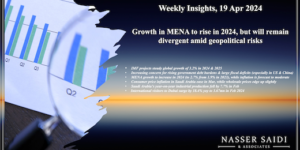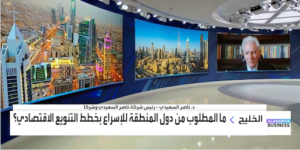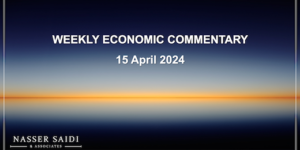Markets
Last week US equities were influenced mainly by the raiding by the FBI of Trump’s personal lawyer, the vagaries of the trade war rhetoric, the FOMC minutes and Trump’s threat of an imminent military strike in Syria which could lead to a direct confrontation with Russia. As a result, Wall Street started the week on the back foot, but as military action failed to materialize, by the weekend the main indices recorded substantial gains of roughly 2%. Other major bourses in Europe, Japan and major emerging markets, followed the lead from the US to close also in positive territory. Regional markets, with the exception of Oman and KSA were also pushed higher by the cheerful mood. However, in bond markets the US yield curve flattened to a point last seen in 2007 after the release of the FOMC minutes. Despite the turmoil, movements in currency markets turned out to be limited, but overall euro positive and yen negative. Oil prices were again pushed up by the mounting geopolitical tensions in Syria, even though US oil inventories rose by 3.3 mb vs consensus expectations of a 1 mb drop. Gold prices oscillated during the week in response to the threats of US strikes in Syria, but ended the week little changed.
Global Developments
US/Americas:
- The US Fed FOMC meeting minutes confirmed the broad consensus over more rate hikes in 2019 and 2020, as the economy is out of the doldrums and unemployment is at a record low. The fiscal stimulus is expected to boost medium term growth despite the uncertainty over timing and magnitude of its impact. The FOMC members seem convinced that the steel and aluminum tariffs will not derail the economy but remarked that retaliations could heighten unpredictable risks.
- US annual inflation reached 2.4% in Mar (although in mom terms it declined by -0.1%) from 2.2% in Feb (0.2% mom) to set a 12 month record, due to higher shelter and used car prices. Core inflation rose 0.2% mom in Mar as in Feb.
- US wholesale inventories jumped up 1% mom in Feb, the same strong performance as in Jan. Wholesale durable goods inventories also gained 1.1% mom while nondurable goods rose 0.8% mom.
- The University of Michigan’s US consumer sentiment sunk unexpectedly to 97.8 in Apr from 101.4 in Mar, erasing the gains of the prior 2 months. Current and future conditions sub-indexes were down due to concerns over trade policies. The index is still near the average of the past 2 years.
Europe:
- The minutes of the ECB’s Governing Council underscored that financial conditions remained loose but tightened somewhat since Jan due to weaker equity markets, euro appreciation and an uptick in market interest rates. Monetary policy remains supportive for firms’ and households’ credit. The ECB staff projects medium term inflation heading to slightly below 2%, in line with the ECB’s mandate.
- The Eurozone’s industrial production fell unexpectedly by -0.8% mom in Feb (the worst performance since last Jun) after another sharp -0.6% drop in Jan. Output fell across the board: capital goods (-3.6% vs 0.6% in Jan), durable consumer goods (-2.1% vs -1.3%), intermediate goods (-0.8% vs -1.1%) and non-durable consumer goods (-0.5% vs 0.4%). It was the third consecutive mom negative result which offset the 1.5% jump recorded in Nov.
- The Eurozone’s trade surplus widened to EUR 18.9bn in Feb from EUR 16.1bn in Feb 2017. Exports increased by 3% yoy to EUR 177.5bn and imports by 1.5% yoy to EUR 158.6bn.
- The German trade surplus fell to EUR 18.4bn in Feb, from EUR 19.8bn a year earlier. Exports rose 2.4% to EUR 104.7bn, but imports increased by 4.7% to EUR 86.3bn.
- The UK’s trade deficit plunged to GBP 0.96bn in Feb vs GBP 2.95bn in Jan. It was the smallest trade deficit since Sep, resulting mainly from a drop in imports.
- UK’s industrial production rose 2.2% yoy in Feb, after a 1.2% gain in Jan, thanks to a 2.5% yoy increase in manufacturing output vs 2.2% in Jan.
Asia Pacific:
- China’s inflation fell -1.1% mom (2.1% yoy) in Mar offsetting a 1.2% mom rise in Feb (2.9% yoy). The plunge exceeded expectations, especially for food prices, and was broad based. PPI inflation declined to 3.1% yoy in Mar from 3.7% in Feb.
- China’s M2 money supply grew by 8.8% yoy in Feb, little changed from 8.6% in Jan. Credit growth decelerated, as usual in Feb, and bank credit was lower than expected, suggesting that demand for mortgages is ebbing.
- China’s trade deficit was USD 5bn in Mar vs a USD 23.6bn surplus a year earlier, and way below consensus forecasts of a USD 27.1bn surplus. It was the first deficit since Feb 2017 resulting from a surge in imports and a decline in exports.
- FDI in China advanced 0.5% yoy to USD 34.7bn in Q1 this year. In Mar alone, FDI rose 0.4% yoy. Considering that in 2017 China FDI went up by 7.9%, the figure is hardly upbeat.
- Japan’s current account surplus fell to JPY 2.1tn in Feb from JPY 2.9tn a year earlier. The goods surplus declined sharply to JPY 1.9tn from JPY 10.8tn a year earlier as exports grew by only 0.9% yoy in the face of a 17.8% yoy import surge.
- Core machinery orders in Japan rose 2.1% mom in Feb adding to a 8.2% jump in Jan. Manufacturing orders jumped 8.0% following a 9.9% jump in Jan.
- Japan’s consumer confidence index was 44.3 in Mar, the same as in Feb, still at historically high level, but below recent highs, as a result of global stock market volatility and the impending trade war.
- India’s industrial production expanded by 7.1% yoy in Feb a tad below the 7.4% recorded in Jan. Electricity production was sluggish (4.5% yoy vs 7.6% in Jan) but manufacturing output rose 8.7% from 8.6% in Jan.
- India’s inflation rose 4.3% yoy in Mar vs 4.4% in Feb, the lowest rate in 5 months thanks to subdued food inflation.
- India’s trade deficit widened to USD 13.7bn in Mar from USD 10.6bn a year earlier. Export declined by -0.7% yoy and imports rose by 7.2% yoy.
- Singapore’s GDP expanded 1.4% qoq ann (4.3% yoy) in Q1 down from 2.1% (3.6% yoy) in Q4. In yearly terms it was the second best performance in 13 quarters thanks to perky manufacturing and wholesale & retail trade, while construction continued to contract.
- Taiwan’s trade surplus doubled to USD 6bn in Mar from USD 2.9bn in Feb thanks to a 16.7% yoy rise in exports and 10.4% in imports after the end of the Lunar New Year celebrations.
Bottom line: The macro data from China and the Eurozone confirm that the uptrend in global growth has stalled, although it has not reversed. The flattening of the US yield curve is a disturbing signal: short-term rates are hiked when at the same time long-term rates reflect worries over protectionism and concerns over the US growth. In any case, even if investors deem that bond yields should be higher, regulations on banks and pension funds, together with quantitative easing in Japan and Europe and various forms of financial repression, ensure continuing demand for government bonds at prices exceeding any reasonable estimate of fundamental values on inflation and growth. Tensions are unlikely to abate at least until a truce is reached in the trade war. Against this backdrop, the escalating geopolitical tensions in Syria expose global growth to an entirely new set of hazards.
Regional Developments
- Bahrain central bank’s foreign assets fell to a 6-month low of BHD 604.8mn in Feb (Jan: BHD 750.8mn). Its net foreign assets are equivalent to only about 35-days worth of imports (versus the “safe” level of 90 days).
- Egypt’s finance ministry is targeting a primary surplus of 2% of GDP in the 2018-19 budget, compared to the 0.3% expected this fiscal year. The draft budget estimates tax revenues to climb to EGP 770.28bn (USD 43.9bn) from EGP 624.2bn this fiscal year, and deficit to narrow to 8.4% from 9.8%..
- According to the finance minister, Egypt’s consumption of petroleum products has fallen by 2-3% this current financial year: the fuel subsidies bill is estimated at EGP 110-115bn this financial year, compared to the allocation of EGP 120bn in the 2017-18 budget. Egypt plans to cut fuel subsidies by a quarter to EGP 89.1bn (USD 5.05bn) and nearly halve those for electricity to EGP 16bn in the next financial year: this is expected to reduce budget costs by USD 2.4bn.
- Egypt approved a draft law to establish a sovereign wealth fund to manage state assets, disclosed the planning minister, with an authorized capital of EGP 200bn and issued capital of EGP 5bn.
- Egypt plans to issue USD 6-7bn worth dollar-denominated Eurobonds in the 2018-19 fiscal year that begins in July, revealed the finance minister. Earlier last week, Egypt raised USD 2.46bn in a dual-tranche euro-denominated bond sale (which attracted an overall EUR 7.5bn in orders) with maturities of 8 and 12 years at rates of 4.75% and 5.625% respectively.
- Annual urban consumer price inflation in Egypt slowed to 13.3% in Mar (Feb: 14.4%) while core inflation fell to 11.59% (Feb: 11.8%).
- Egypt’s foreign currency reserves increased to USD 42.611bn as of end-Mar (end-Feb: USD 42.524bn); foreign currencies’ balance in Egypt’s international reserves increased to USD 39bn in Mar, up from USD 25bn a year ago.
- Iraq exported nine shipments of natural gas condensates and 21 shipments of gas liquids in Q1 this year, according to its oil ministry and main gas processing company. Totaling 188,838 cubic metres of condensates in Q1; it was all exported to the UAE.
- Iraq postponed its oil and gas bidding round for 11 new blocks to Apr 25, from the previously announced Apr 15.
- Kuwait’s remittance tax bill, approved by the financial committee, has been opposed by the legislative committee, citing constitutionality. Remittance outflow from Kuwait was USD 15.3bn in 2016, with nearly 27% sent to India.
- Preparations for the introduction of selective excise tax in Kuwait is likely to be completed within a month, revealed sources from the ministry of finance. According to these sources, if the selective excise tax is applied, it will be added to the old prices (before the recent price increase).
- Lebanon’s Byblos Bank/AUB Consumer Confidence Index improved by 5.9% qoq in Q4 2017, recording a monthly average of 61.8 (the 13th highest reading in 42 quarters).
- Oman’s fiscal deficit for the first nine months of 2017 declined -47.5% to around OMR 3bn from OMR 4.43bn during the same period of 2016, according to the Central Bank of Oman.
- Qatar raised USD12bn in its first dollar bond sale in two years, after having received orders in excess of USD 53bn.
- Qatar Central Securities Depository amended the foreign ownership percentage (to 49% from 25%) in the shares of a number of companies listed in the Qatar stock market including Industries Qatar, Qatar Electricity and Water, Qatar Islamic Bank and Qatar Industrial Manufacturing Company.
- Saudi Arabia raised USD 11bn in its fourth international public bond sale (after attracting USD 52bn of orders): with this, the country has covered its dollar funding for the year, and domestic bond issues will be the focus during the rest of the year, according to the debt management office.
- Saudi Arabia’s sovereign credit rating was affirmed at A1 by Moody’s, thanks to the country’s fiscal consolidation efforts.
- New oil price-linked royalties applied to all of Aramco’s oil production: according to Bloomberg, a new levy on revenue was created, with a marginal rate of 50% when crude rises above USD 100 a barrel; this replaces a 20% fixed levy on revenue which has been in place for decades.
- More than 350,000 new jobs are likely to be created in Saudi Arabia, with 140k of these going to Saudi citizens, according to an official report issued by the General Authority for Statistics. Unemployment rate among Saudis increased to 12.7%in Q1 this year; of the 906,552 Saudis seeking jobs, more than three-quarters are women.
UAE Focus
- Real estate transactions in Dubai totaled AED 58bn through 13,759 transactions in Q1 this year, according to the Dubai Land Department. UAE nationals invested AED 4bn via 1587 transactions, followed by Indians (AED 3bn through 1550 transactions) and Saudis (AED 1.3bn).
- Guarantees provided by the UAE-based banks increased to AED 389.4bn (USD 106bn) in Feb, from AED 388.98bn in Jan. At end-Q4, bank guarantees were at AED 384.47bn.
- Sales at the Dubai Duty Free increased by 11% yoy to AED 1.91bn in Q1 this year. Monthly sales were in excess of AED 600mn, with an average daily sale of AED 21.23mn and Mar posted a new monthly sales record of AED 660.36mn.
- Nearly 275,000 companies and individuals have registered for the Value-Added Tax with the UAE Federal Tax Authority in the 100 days since the beginning of the year. According to the FTA, VAT compliance ratio was 98.8%. As many as 77 tax agents have passed the FTA exam while 21 are currently registered.
- GDP in Fujairah touched AED 15.4bn (USD 4.1bn) in 2017, according to the Annual Statistical Book 2017 of Fujairah. The value of direct foreign trade amounted to AED 6.4bn, while free zone trade was AED 8bn.
- FDI inflow was disclosed by the various emirates at the Annual Investment Meeting: the volume of FDI into Abu Dhabi grew by 7.1% yoy to AED 108bn (USD 29bn) in 2017; European countries’ investment in Abu Dhabi region reached 44% of the total FDI volume last year. Dubai attracted AED 27.3bn in FDI in 2017, up 7.1%, and was among the top 10 international cities attracting investments. Sharjah recorded a 100% increase in FDI inflow to AED 5.97bn (2016: AED 920mn), bringing the cumulative international investments in Sharjah to AED 36bn.
- The UAE approved a draft law on equal pay for equal work: this was announced by the UAE’s Vice-President and Prime Minister on his Twitter handle.
- Abu Dhabi National Oil Co. (Adnoc) will issue its first competitive tender for partners to explore for and develop oil and natural gas: the partners would have to pay for exploration, and once production starts, Adnoc would take a 60% stake.
Media Review
US-China rivalry will shape the 21st century
https://www.ft.com/content/5f796164-3be1-11e8-b9f9-de94fa33a81e
The Unintended consequences of Trump’s trade war
https://www.bloomberg.com/news/articles/2018-04-12/get-ready-for-the-unintended-consequences-of-trump-s-trade-war
The unbearable burden of stock valuations
https://www.ft.com/content/f050d7e0-3f23-11e8-b7e0-52972418fec4
The Aramco Accounts
https://www.bloomberg.com/news/articles/2018-04-13/the-aramco-accounts-inside-the-world-s-most-profitable-company
Powered by:







